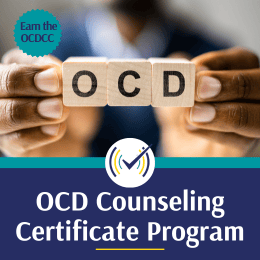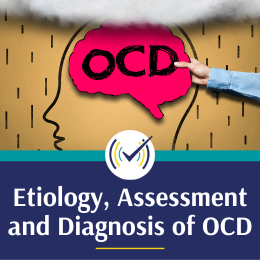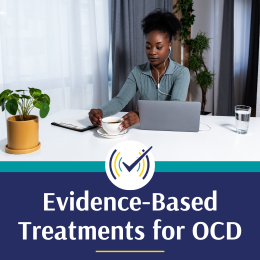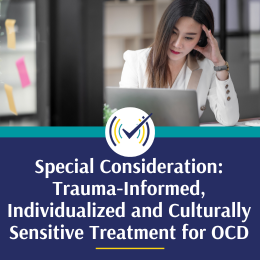Complete these three courses led by Dr. Melanie Smith and earn the Obsessive-Compulsive Counseling Certificate (OCDCC)
18 CE hours available for behavioral health clinicians completing each of the three online self-study courses
This training program offers a bundle of three courses and the Obsessive-Compulsive Counseling Certificate (OCDCC).
This comprehensive OCD Training Certificate Program provides an in-depth examination of the etiological and maintaining factors of OCD. As OCD often co-occurs with other mental health conditions, this training provides training on differential diagnosis, as well as guidance on how to develop comprehensive treatment plans when individuals experience co-morbid OCD, including the use of exposure and response prevention (ERP).
Review of current literature and case examples highlights the treatment challenges including ethical considerations, possible medical complications, recidivism rates, fair treatment projection, and potential long lengths of stay in treatment.
Additionally, the adaptations and considerations for provided quality care in a way that is both trauma-informed and culturally sensitive is emphasized. This intensive training certificate provides clinicians with evidence-based and practical tools to effectively and competently work with individuals with OCD in various treatment settings.
Earning a certification, credential, or certificate in a specialty validates your knowledge and expertise and demonstrates your commitment to providing high-quality, evidence-based treatment. Upon completing the program, you'll receive your Obsessive-Compulsive Counseling Certificate (OCDCC) to be added to your existing credentials.
Register for the 3-course bundle for the full Certificate Program with a discounted fee that includes the OCDCC.
- OCD Counseling Certificate Program
- Description
- Learning Objectives
- Instructor
- CE Hours
- How to Complete the Courses and Earn CEs
- How to Earn the OCDCC
- Course Policies
- Who Should Attend
- Teaching Methods
- Course Availability
Select each tab above to view specific details about this course
This comprehensive OCD Training Certificate Program provides an in-depth examination of the etiological and maintaining factors of OCD. As OCD often co-occurs with other mental health conditions, this training provides training on differential diagnosis, as well as guidance on how to develop comprehensive treatment plans when individuals experience co-morbid OCD, including the use of exposure and response prevention (ERP).
A review of current literature and case examples highlights the treatment challenges, including ethical considerations, possible medical complications, recidivism rates, fair treatment projection, and potential long lengths of stay in treatment.
Additionally, the adaptations and considerations for providing quality care in a way that is both trauma-informed and culturally sensitive is emphasized. This intensive training certificate provides clinicians with evidence-based and practical tools to effectively and competently work with individuals with OCD in various treatment settings.
Courses included with this registration:
Etiology, Assessment and Diagnosis of OCD
Evidence-Based Treatments for OCD: Exposure and Response Prevention (ERP)
Special Consideration: Trauma-Informed, Individualized and Culturally Sensitive Treatment for OCD
Enrollment in this 3-course bundle also includes the Obsessive-Compulsive Disorder Counseling Certificate, which is available to participants once coursework has been completed.
These are non-interactive self-study online courses that consist of over 18 hours of video training content. (6+ per course)
This program was recorded on 1/19/24, 1/26/24 and 2/2/24
After participating in Etiology, Assessment and Diagnosis of OCD participants will be able to:
Discuss the heritability of OCD.
List at least two environmental factors that impact the development of OCD.
Identify the diagnostic criteria for OCD, including rule-outs for the condition.
Assess clients for overlapping symptom presentations and differentiate OCD from other diagnoses.
After participating in Evidence-Based Treatments for OCD: Exposure and Response Prevention (ERP) participants will be able to:
Explain the rationale for utilizing emotional exposure strategies for the management of OCD symptoms.
Describe two theoretical principles of exposure.
Create an individualized exposure hierarchy using a sample case.
Discuss the benefits and challenges of incorporating psychopharmacological interventions for individuals with OCD.
After participating in Special Considerations: Trauma-Informed, Individualized, and Culturally Sensitive Treatment for OCD participants will be able to:
List at least two adaptations required for treating children with OCD.
Describe at least one unique consideration of treating perinatal OCD.
Identify at least two intersectional factors that should be considered when individualizing OCD treatment.
Apply the principles of trauma-informed care to exposure-based treatment for OCD.
Melanie Smith, PhD, LMHC, CEDS-S
Melanie Smith, PhD, LMHC, CEDS-S, is the Director of Training for The Renfrew Center for Eating Disorders. In this role, she provides ongoing training, supervision and consultation to clinicians across disciplines for the purpose of continually assessing and improving competence in the treatment of eating disorders. Dr. Smith is co-author of The Renfrew Unified Treatment for Eating Disorders and Comorbidity Therapist Guide and Workbook (Oxford University Press), is a Certified Eating Disorders Specialist and Approved Supervisor, and is a Certified Therapist and Trainer for the Unified Protocol for the Transdiagnostic Treatment of Emotional Disorders (UP). In addition to her work with the Renfrew Center, Dr. Smith maintains a telehealth private practice specializing in the supervision and consultation of registered mental health counselor interns (Florida) and individuals seeking eating disorder specialist certification through the International Association of Eating Disorders Professionals (iaedp).
You can find more information about Dr. Smith here and the Renfrew Center here.
A total of 18 CE hours (6 per course) can be earned with completion of all courses
Counselors: Telehealth Certification Institute, LLC has been approved by NBCC as an Approved Continuing Education Provider, ACEP No, 6693. Programs that do not qualify for NBCC credit are clearly identified. Telehealth Certification Institute, LLC is solely responsible for all aspects of the programs. These four courses qualify for a total of 18 non-contact hours.
Telehealth Certification Institute, LLC is recognized by the New York State Education Department's State Board for Mental Health Practitioners as an approved provider of continuing education for licensed mental health counselors. #MHC-0048. Approval renewal date: 1/31/2026
Marriage and Family Therapists: Many MFT licensing boards accept our courses or one of the approvals which we have from professional associations. You can check with your board to determine if this course would be accepted by your licensing board.
Social Workers: Telehealth Certification Institute LLC, #1609, is approved to offer social work continuing education by the Association of Social Work Boards (ASWB) Approved Continuing Education (ACE) program. Organizations, not individual courses, are approved as ACE providers. State and provincial regulatory boards have the final authority to determine whether an individual course may be accepted for continuing education credit. Telehealth Certification Institute LLC maintains responsibility for this course. ACE provider approval period: 05/02/2021 – 05/02/2024. Social workers completing these four courses receive a total of 18 clinical continuing education credits.
Telehealth Certification Institute, LLC is recognized by the New York State Education Department's State Board for Social Work as an approved provider of continuing education for licensed social workers #SW-0435. Approval renewal date: 2/28/2026
Addiction Professionals: Telehealth Certification Institute is an approved provider of continuing education by NAADAC, The Association for Addiction Professionals, provider #193104, effective 2/20/2024. Full attendance is required; no partial credit will be awarded for partial attendance.
Psychologists: Telehealth Certification Institute LLC is approved by the American Psychological Association to sponsor continuing education for psychologists. Telehealth Certification Institute LLC maintains responsibility for this program and its content.
Telehealth Certification Institute, LLC is recognized by the New York State Education Department’s State Board for Psychology as an approved provider of continuing education for licensed psychologists #PSY-0128. Effective 8/31/2021 – 8/31/2024
Art Therapists: Telehealth Certification Institute, LLC is recognized by the New York State Education Department's State Board for Mental Health Practitioners as an approved provider of continuing education for licensed creative arts therapists #CAT-0093. 7/21/2021 – 7/31/2024
Other Professionals: These activities qualify for a total of 1080 minutes of instructional content as required by many national, state and local licensing boards and professional organizations. Retain your certificate of completion and contact your board or organization for specific filing requirements.
These are non-interactive, online self-study online courses.
To receive your certificate of completion you must complete the course in its entirety.
Online courses are completed by registering, logging in, navigating to your course using the menu (My Courses – the Course Title), completing all of the modules, completing and passing the post-test, and completing the course evaluation. Participants have 6 months from registration to access and complete online self-study courses.
Live Webinar courses are completed by registering, logging in to this website, navigating to your course using the menu (My Courses – the Course Title), attending the full course via webinar, submitting your attendance, and completing the post-test and course evaluation online.
Psychologists and other professionals seeking CE credit through our approval with the American Psychological Association are asked, but not required, to complete the course evaluation before obtaining their certificate of completion, however passing a post-test for online self-study courses and live webinars, and submitting one's attendance for live on-site and live webinars is required.
You can receive your certificate of completion by logging onto this website, navigating to the course using the menu (My Courses – the Course Title), scroll to the bottom of your course, and click on your certificate to either download it or print it.
Directions for completing a course can be found by clicking here.
The Obsessive-Compulsive Disorder Counseling Certificate (OCDCC) program requires completion of three courses:
Etiology, Assessment and Diagnosis of OCD
Evidence-Based Treatments for OCD: Exposure and Response Prevention (ERP)
Special Consideration: Trauma-Informed, Individualized and Culturally Sensitive Treatment for OCD
Successful completion of each course will earn participants the OCD Counseling Certificate (OCDCC)
Accommodations for Individuals with Disabilities
Click here to view our Accommodations for Individuals with Disabilities.
Cancellation Policy
Refunds are offered within the first 30 days for courses which have not been completed. There is a $25 service fee for refunds.
Grievance Policy
This course is intended for clinicians who provide behavioral health services.
Teaching methods for this course include recorded lectures, videos, a post-test, and a course evaluation.
This program was recorded 1/19/24, 1/26/24, and 2/2/24
You have six months to access online courses from the time of purchase.
Earning the Obsessive-Compulsive Counseling Certificate (OCDCC) requires completion of three courses. Registration for individual courses can be made to complete the three-course bundle. Please contact our support team for details or to inquire about your progress toward earning the OCDCC.
Individual event registration is also available:
Obsessive-Compulsive Disorder (OCD) is a mental health condition characterized by obsessions (repetitive, intrusive, and distressing thoughts) and compulsions (repetitive behaviors or mental acts performed in response to the obsessions) that has a profound impact on functioning and quality of life. While much of the internal process of OCD is unseen or hidden, it is important for clinicians to understand the etiological factors that influence the development and maintenance of OCD. As OCD often co-occurs with other mental health conditions, it can be useful to learn how to differentiate the myriad of symptoms of OCD from other disorders with overlapping symptom presentations.
This presentation will provide a review of the literature surrounding the etiological and environmental risk factors for the development of OCD, as well as the maintenance of its symptoms. Direct guidance on early intervention and how to best educate clients and their loved ones on the condition, as well as key management strategies, will also be provided. Assessment tools, strategies for clinical interviews, and diagnostic criteria will be explored, including an opportunity for participants to practice differential diagnosis using complex case examples.
- Discuss the heritability of OCD.
- List at least two environmental factors that impact the development of OCD.
- Identify the diagnostic criteria for OCD, including rule-outs for the condition.
- Assess clients for overlapping symptom presentations and differentiate OCD from other diagnoses.
Obsessive-Compulsive Disorder (OCD) is a complex condition, and the severity of symptoms can vary widely from person to person. The pervasive nature of the disorder, as well as complicating factors such as co-occurring mental health conditions, can lead to clinician anxiety and uncertainty about how to best proceed with treatment. Therefore, comprehensive training in utilizing evidence-based strategies is crucial to ensuring that individuals with OCD receive the best quality of care possible.
This presentation will provide an overview of the existing evidence-based treatments for OCD and related disorders, with an in-depth look at Cognitive Behavioral Therapy with Exposure and Response Prevention (ERP), which has long been considered the gold standard for treatment. Clinicians will receive intensive training on the theoretical principles of new learning through exposure, will learn how to develop individualized exposure hierarchies to best target OCD symptoms, and will be given direct guidance on how to provide exposure opportunities in a variety of treatment settings. Reviews of the literature indicate that ERP combined with psychotropic medications may improve outcomes; therefore, an overview of the psychopharmacological treatment of OCD, as well as recommendations for multidisciplinary collaboration, will be provided.
- Explain the rationale for utilizing emotional exposure strategies for the management of OCD symptoms.
- Describe two theoretical principles of exposure.
- Create an individualized exposure hierarchy using a sample case.
- Discuss the benefits and challenges of incorporating psychopharmacological interventions for individuals with OCD.
OCD is a highly heterogeneous disorder that can affect individuals of all ages, genders, and racial/ethnic backgrounds. Individuals with OCD may have a wide range of obsessions and compulsions, some of which can be caused by or exacerbated by lived experiences, making it challenging to tailor treatment to each person's specific needs. What works for one person with OCD may not work for another, and understanding and accounting for cultural and systemic factors are necessary for removing barriers to accessing care, preventing re-traumatization, and improving treatment outcomes.
This presentation makes the case for trauma-informed, individualized, and culturally sensitive treatment for OCD. The training will assist clinicians in tailoring treatment to the unique characteristics and contexts in which a person lives, and considerations for adapting treatment for a wide range of patient populations, including children and pregnant individuals, will be explored. Ethics and boundaries, the therapeutic relationship, and the benefits of ongoing supervision and consultation will be emphasized.
- List at least two adaptations required for treating children with OCD.
- Describe at least one unique consideration of treating perinatal OCD.
- Identify at least two intersectional factors that should be considered when individualizing OCD treatment.
- Apply the principles of trauma-informed care to exposure-based treatment for OCD.

Melanie Smith
PhD, LMHC, CEDS-S
Melanie Smith, PhD, LMHC, CEDS-S, is the Director of Training for The Renfrew Center for Eating Disorders. In this role, she provides ongoing training, supervision and consultation to clinicians across disciplines for the purpose of continually assessing and improving competence in the treatment of eating disorders. Dr. Smith is co-author of The Renfrew Unified Treatment for Eating Disorders and Comorbidity Therapist Guide and Workbook (Oxford University Press), is a Certified Eating Disorders Specialist and Approved Supervisor, and is a Certified Therapist and Trainer for the Unified Protocol for the Transdiagnostic Treatment of Emotional Disorders (UP). In addition to her work with the Renfrew Center, Dr. Smith maintains a telehealth private practice specializing in the supervision and consultation of registered mental health counselor interns (Florida) and individuals seeking eating disorder specialist certification through the International Association of Eating Disorders Professionals (iaedp).
You can find more information about Dr. Smith here and the Renfrew Center here.







The course was so informative and I was glued to my screen for the entire duration. I received so much knowledge concerning ethics in telehealth and I am greatly encouraged to read about all the standards and policies that pertain to my practice. Thank you!.